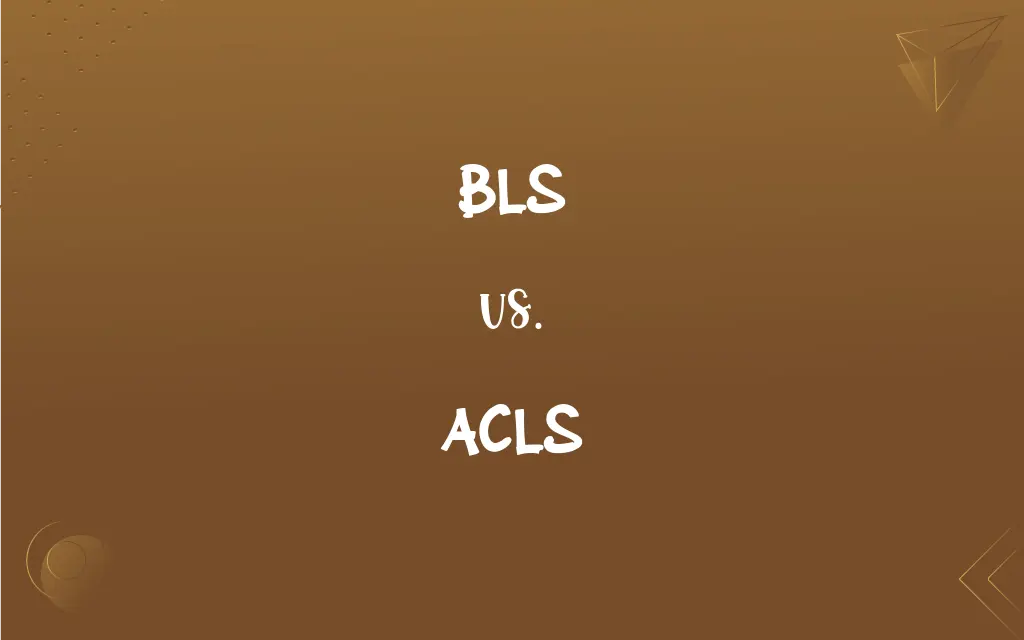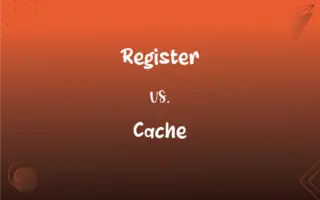BLS vs. ACLS: What's the Difference?
Edited by Aimie Carlson || By Harlon Moss || Published on February 4, 2024
BLS (Basic Life Support) involves basic medical care techniques, while ACLS (Advanced Cardiac Life Support) includes advanced medical procedures for critical cardiac conditions.

Key Differences
Basic Life Support (BLS) primarily focuses on maintaining a patient's ABCs - Airway, Breathing, and Circulation. It includes skills like CPR and use of an AED. Advanced Cardiac Life Support (ACLS), however, deals with more complex life-saving techniques, often used in hospitals or emergency medical settings.
BLS is a foundational level of medical care, essential for all healthcare providers and even laypersons. In contrast, ACLS is an advanced level of care, typically pursued by healthcare professionals like doctors and nurses who have already mastered BLS skills.
Training for BLS is relatively straightforward and short, focusing on immediate response scenarios. ACLS training is more comprehensive, covering in-depth cardiac life support strategies, including medication administration and ECG interpretation.
BLS certification is often a prerequisite for ACLS certification. While BLS lays the groundwork for emergency response, ACLS builds upon that foundation with advanced techniques tailored for critical cardiac emergencies.
BLS and ACLS differ in complexity and depth. BLS serves as the first line of defense in emergencies, while ACLS provides specialized interventions for more severe cardiac conditions.
ADVERTISEMENT
Comparison Chart
Level of Training
Basic
Advanced
Focus
Basic life-saving interventions
Complex cardiac and respiratory emergencies
Target Audience
Healthcare providers, public
Experienced healthcare professionals
Certification Duration
Shorter, less comprehensive
Longer, more detailed
Skills Acquired
CPR, AED usage
ECG interpretation, advanced airway management
ADVERTISEMENT
Prerequisites
None
BLS certification
BLS and ACLS Definitions
BLS
BLS encompasses the initial medical assistance given to a person in a critical state.
BLS is essential knowledge for anyone working in a high-risk environment.
ACLS
ACLS is a set of clinical interventions for urgent treatment of stroke, myocardial infarction, and other heart-related emergencies.
The doctor used his ACLS knowledge to administer the right drugs during the crisis.
BLS
BLS stands for Basic Life Support, a level of medical care used in emergency situations.
The paramedics performed BLS to stabilize the patient until they reached the hospital.
ACLS
ACLS stands for Advanced Cardiac Life Support, involving specialized interventions for heart emergencies.
The nurse's ACLS training was crucial in managing the patient's heart attack.
BLS
BLS is the foundational support provided before advanced medical help arrives.
The lifeguard used BLS skills to keep the drowning victim alive.
ACLS
ACLS includes advanced resuscitation techniques beyond basic life support.
ACLS training taught her how to effectively manage complex cardiac scenarios.
BLS
BLS involves basic emergency protocols like maintaining airway and supporting breathing.
As a firefighter, he was trained in BLS for rescue operations.
ACLS
ACLS refers to advanced medical procedures for life-threatening cardiac conditions.
ACLS protocols were followed to stabilize the cardiac arrest victim.
BLS
BLS refers to the basic procedures for sustaining life, including CPR.
During the first aid course, we learned BLS techniques like chest compressions.
ACLS
ACLS is the advanced practice of life-saving measures, particularly in cardiac and respiratory emergencies.
His expertise in ACLS was evident in how he handled the respiratory failure case.
FAQs
What is the main focus of BLS?
Providing basic emergency care like CPR and AED use.
Is BLS a prerequisite for ACLS?
Yes, BLS skills are foundational for ACLS training.
Can a layperson take ACLS training?
It's designed for those with medical training due to its advanced nature.
What does ACLS stand for?
Advanced Cardiac Life Support.
Who is ACLS intended for?
Healthcare professionals with prior BLS training.
Who can learn BLS?
Both healthcare professionals and the general public.
What does BLS stand for?
Basic Life Support.
How long does BLS certification last?
Typically 2 years.
Do nurses need ACLS certification?
It's highly recommended, especially for those in emergency or critical care.
Can BLS training be used in drowning incidents?
Yes, BLS skills are applicable in drowning situations.
Does ACLS certification include BLS certification?
Usually, ACLS certification assumes prior BLS knowledge but doesn't always include it.
What skills does ACLS training include?
Advanced resuscitation techniques, ECG interpretation, and medication administration.
What's the difference in training duration between BLS and ACLS?
ACLS training is more extensive and longer than BLS.
How often should one update their BLS skills?
Regular updates, typically every two years, are recommended.
How long does ACLS certification last?
Generally 2 years, like BLS.
Can BLS be performed anywhere?
Yes, BLS techniques can be applied in any emergency setting.
Are there any prerequisites for BLS training?
No, there are no prerequisites for learning BLS.
Is BLS sufficient for handling heart attacks?
BLS provides basic care, but ACLS is better suited for complex cardiac cases.
Is online certification for BLS valid?
It depends on the provider and the recognition by employers or institutions.
Is ACLS training useful for all doctors?
It's particularly beneficial for those in emergency, cardiac, and intensive care specialties.
About Author
Written by
Harlon MossHarlon is a seasoned quality moderator and accomplished content writer for Difference Wiki. An alumnus of the prestigious University of California, he earned his degree in Computer Science. Leveraging his academic background, Harlon brings a meticulous and informed perspective to his work, ensuring content accuracy and excellence.
Edited by
Aimie CarlsonAimie Carlson, holding a master's degree in English literature, is a fervent English language enthusiast. She lends her writing talents to Difference Wiki, a prominent website that specializes in comparisons, offering readers insightful analyses that both captivate and inform.

































































